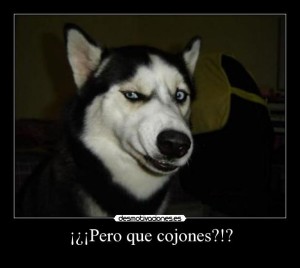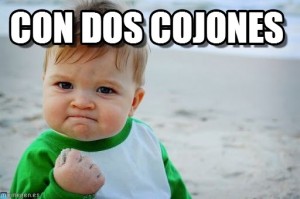The things you learn on roadtrips.
On a recent one with some Spanish friends, I learned just how important cojones are to Spanish people.
It happened just after we passed Toledo heading southbound. Tio Pepe blurted out from the back seat, “Tocame los cojones! Que me voy a Bargas! Y si no me los toca… a Menasalbas!”
Hwhhaaaaat?
While my three Spanish compadres were laughing among themselves, I was once again left scratching my head at some vulgar Spanish expression whose meaning completely escaped me.From what I could gather from Pepe’s explanation, the expression had something to do with two towns we’d passed – Bargas and Menasalbas – south of Toledo. I’d never heard of those towns before, but I’d heard plenty of expressions using that oh-so-familiar Spanish word for testicles.
“Spanish people talk about cojones a lot,” I intimated to my friends.
They all agreed. Eager to impress upon me just how essential cojones are to Castellano, my travel companions took the opportunity to school me on several uses and variants of the word. And I took notes. Here are some of my favorites:
- que cojones…? – used as part of a rhetorical question, as in, ‘que cojones es esto (what the hell is this)?
- hasta los cojones – (to have had it) up to here; to be fed up. Literal translation: up to the balls.
- acojonante – fabulous, amazing.
- vas como los cojones de los galgos – used when someone lags behind. A galgo is a Spanish greyound. Approximate translation: you’re moving like greyhounds’ balls.

- par de cojones – when someone is brave or fearless they are said to have a par de cojones or to have done something con dos cojones. Literal translation: a pair of balls.
- cojonudo – awesome, amazing, great
- cojonazos (aka, huevasos) – guy who is henpecked, or a guy who sits around ‘tocando sus cojones’ (touching his balls / doing nothing) all day.
- un cojon – a whole lot. (e.g., ‘te quiero un cojon’)
- mil pares de cojones – with a lot of force, effort, or difficult. Literal translation: A thousand pairs of balls.
And that’s just a short list. Turns out there are dozens more uses for the word cojones in Spain. Which means that cojones could quite possibly be the most versatile word ever.


Haha, I love this so much. The Spanish language (Castellano Spanish) is soooo freakin’ colorful and fun. And you know you aren’t truly fluent until you can use “la lecha” and “los cojones” in at least 1,000 ways. Lol. Loved this! Sharing 😉
Hey, Gloria – thanks! Man – I think the Spanish have swearing down to an art! Like the most vulgar poetry… lol. Thanks for reading and for sharing!